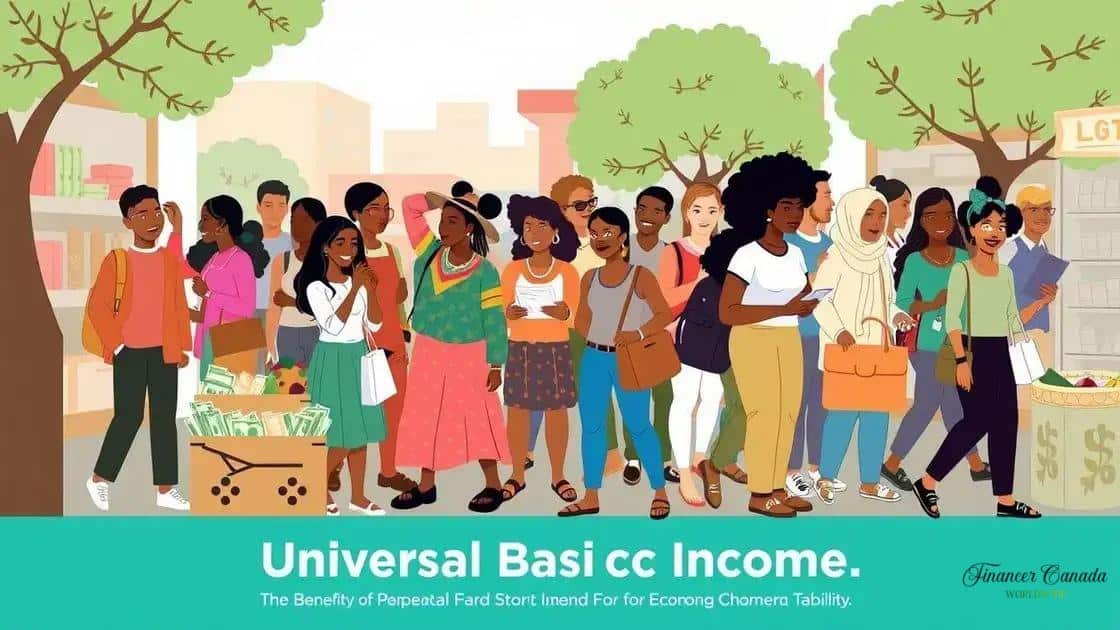Universal basic income as a potential solution for poverty

Universal basic income is a financial system providing regular, unconditional payments to individuals, aimed at reducing poverty and promoting economic stability and equity.
Universal basic income as a potential solution for poverty has sparked much debate. Could this approach really change lives? Let’s dive into its implications and explore how it might work for us.
Understanding universal basic income
Understanding universal basic income is crucial to grasp its implications for society. This concept proposes a system where every individual receives a set amount of money regularly, regardless of their circumstances. The idea is to provide financial stability and reduce poverty.
The core principles of UBI
Universal basic income is designed to ensure that basic needs are met. Here are some of its key principles:
- Unconditional: Everyone receives UBI without conditions.
- Regular payments: Payments occur at regular intervals, ensuring consistent support.
- Adequate amount: UBI should be sufficient to cover basic living expenses.
These principles highlight how UBI aims to provide a safety net and promote equality. By offering financial resources, individuals can focus on education, entrepreneurship, and other endeavors that strengthen communities.
How UBI can transform lives
Universal basic income can shift the way people experience work. With financial security, individuals may feel empowered to pursue jobs that interest them rather than ones that simply pay the bills. This can lead to a more fulfilled and engaged population.
Imagine a system where creativity thrives and people can explore their passions without the burden of financial strain. UBI encourages innovation and may boost local economies as individuals invest in their communities.
As more people understand universal basic income, discussions about its potential for reducing poverty will likely grow. Evaluating case studies from places that have implemented UBI initiatives can provide deeper insights into its benefits and challenges.
How UBI can alleviate poverty

Universal basic income (UBI) has the potential to significantly alleviate poverty by providing financial support to everyone, regardless of their circumstances. This regular income can help individuals meet basic needs like food, shelter, and healthcare.
Direct impact on daily life
When people receive UBI, they often report a greater sense of security. With a stable income, individuals can plan better and make choices that improve their quality of life. Imagine not worrying about the next paycheck or unexpected expenses; this peace of mind can pave the way for personal growth.
- Reduction in stress and anxiety.
- Improved mental health outcomes.
- Increased access to education and job training.
These factors indicate how UBI may create a positive feedback loop. As individuals engage in education or job training, they are likely to find better employment opportunities, leading to higher earnings over time.
Supporting local economies
Another critical aspect of UBI is its potential to boost local economies. As people receive payments, they spend that money within their communities. This influx of cash can support small businesses and create new jobs.
Moreover, a well-implemented UBI system can reduce reliance on social welfare programs, freeing up resources for other initiatives. By streamlining financial support, resources can be directed toward education, health care, and other essential services.
Ultimately, universal basic income can serve as a break from the cycle of poverty. By providing everyone with the means to sustain themselves, we can move towards a more equitable society.
Case studies: UBI in practice
Case studies on universal basic income (UBI) offer real-world examples of how this concept can work in practice. By examining different implementations, we can better understand the benefits and challenges of UBI.
Finland’s Experiment
In 2017, Finland launched a bold UBI trial, providing a monthly payment to 2,000 unemployed citizens. The goal was to evaluate if a basic income could encourage people to seek employment. Participants reported increased well-being and reduced stress.
- Improved mental health among recipients.
- Participants felt more secure in their financial situation.
- No significant increase in employment, but many sought new opportunities.
This case demonstrates that while immediate employment outcomes might be limited, the overall impact on happiness can substantially change lives.
California’s Stockton Economic Empowerment Demonstration (SEED)
An exciting initiative took place in Stockton, California, where 125 residents received $500 monthly for 18 months. This program focused on low-income individuals to see how the payment affected their lives.
Results showed positive changes, including:
- Participants experienced less financial instability.
- More people reported having time to pursue education and jobs.
- Local businesses benefited from increased spending.
The findings from Stockton suggest that universal basic income can stimulate local economies while helping individuals meet basic needs.
These case studies underline how UBI has the potential to alter not just individual lives, but also the broader community landscape. As more cities and countries explore similar programs, the evidence collected will help shape future policies.
Challenges and criticisms of UBI

Universal basic income (UBI) is a compelling idea, but it also faces many challenges and criticisms. Understanding these issues is important for assessing its viability.
Funding UBI
One of the biggest concerns regarding UBI is how to finance it. Critics argue that providing everyone with a guaranteed income would require substantial funding. Determining the sources of this funding can be complex.
- Higher taxes on the wealthy and corporations.
- Reallocating funds from existing welfare programs.
- Implementing new taxes such as a value-added tax (VAT).
Each of these options has potential drawbacks. For instance, increased taxes may discourage economic growth or lead to public pushback.
Work Incentives
Another criticism focuses on the idea that universal basic income could reduce individuals’ motivation to work. Some believe that if people receive a steady income without having to work, they may choose not to seek employment.
This concern raises valid questions about how UBI might change work ethics and attitudes. Supporters argue that UBI could enable people to pursue more fulfilling careers or education, rather than taking jobs just for survival. However, the fear of dependency remains a significant talking point among skeptics.
Social equity
Critics also question whether UBI truly addresses social inequities. They argue that giving everyone the same amount, regardless of their circumstances, may not adequately support those in greater need.
Addressing poverty might require more targeted approaches, such as enhanced support for education, health care, and housing. While UBI aims to simplify welfare systems, some believe it may overlook the complexities of poverty.
The debates around the challenges and criticisms of universal basic income are essential for understanding its future. Exploring these issues helps to foster a comprehensive discussion about the best ways to alleviate poverty and promote economic stability.
Future outlook for universal basic income
The future outlook for universal basic income (UBI) is becoming increasingly relevant as more discussions around poverty and economic stability emerge. As various nations contemplate implementing UBI, understanding its potential trajectories is essential.
Growing Interest Globally
Countries around the world are beginning to explore UBI as a serious option. From Europe to the Americas, policymakers are examining its feasibility and potential impacts. The COVID-19 pandemic has accelerated these discussions, highlighting the vulnerabilities in existing social safety nets.
- Increased public awareness about economic disparities.
- Pilot programs initiated in countries like Spain and Canada.
- Research demonstrating the benefits of financial support during crises.
This interest indicates that UBI is no longer merely a theoretical debate; it is becoming a practical consideration for future policies.
Technology and Automation
As technology advances and automation expands, many jobs will change or disappear. This shift raises the question of how society will support individuals replaced by machines. UBI could serve as a buffer, providing financial support as the workforce adapts to new realities.
Experts suggest that as job markets evolve, embracing UBI might become necessary to ensure economic stability:
- UBI could help retrain workers for new job opportunities.
- Maintain consumer spending, which is vital for economic health.
- Encourage innovation by allowing people to take risks without the fear of losing their income.
In a rapidly changing world, universal basic income could provide a safety net for those navigating transitions in the labor market.
Policy Implications and Future Developments
The implementation of UBI will require cooperative efforts among governments, businesses, and communities. Discussions about how to fund UBI and its integration with existing welfare systems are ongoing. As countries gather more data from trials and studies, we can expect to see refined proposals moving forward.
This will shape the future of economic policy, driving conversations about equity, prosperity, and the role of government in ensuring the welfare of its citizens. The journey toward universal basic income is just beginning, but its potential to transform lives and communities is immense.
universal basic income presents a promising approach to address poverty and inequality. As we’ve seen through various case studies and discussions, UBI could empower individuals to pursue education, enhance well-being, and stimulate local economies.
Challenges remain, particularly regarding funding and societal perceptions, but the growing interest in UBI indicates a shift towards more supportive economic policies.
As we continue to explore and refine these ideas, UBI could play a significant role in shaping a fairer and more resilient future for all.
FAQ – Frequently Asked Questions about Universal Basic Income
What is universal basic income (UBI)?
Universal basic income is a financial support system where all individuals receive a set amount of money regularly, regardless of their employment status.
How can UBI help reduce poverty?
UBI can provide financial stability, allowing individuals to meet their basic needs and pursue education, ultimately helping to alleviate poverty.
What are the main criticisms of UBI?
Critics highlight concerns about funding sources, potential disincentives to work, and whether UBI adequately addresses inequalities.
Is there evidence that UBI works?
Yes, case studies from various regions show positive outcomes, such as improved mental health and economic benefits in communities where UBI has been tested.





